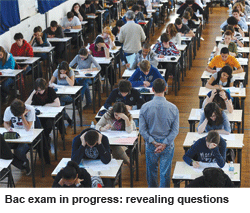Both relief and tears greeted the results of France’s school-leaving baccalaureat exam on July 5. With breathtaking efficiency, the entire country’s exam papers were corrected and marked within just two weeks. Founded in 1808 by Napoleon, the bac is an entry ticket to university as well as a yearly national ritual, which opens with a gruelling compulsory four-hour philosophy general paper that even scientists have to write. This year the papers were particularly revealing of how French youngsters are taught to view the world.
 “What do we owe to the State?” was one essay option in the philosophy exam. In the economics and social science paper, pupils were asked to comment on a wealth-distribution table, showing that 10 percent of French households owned 48 percent of the country’s wealth, and then told to “demonstrate that social conflict can be a factor behind social cohesion”. “We still have the mentality of the class struggle,’’ says Nicolas Lecaussin of the Institute for Research in Economic and Fiscal issues (IREF), a think tank, and author of a report on economics textbooks.
“What do we owe to the State?” was one essay option in the philosophy exam. In the economics and social science paper, pupils were asked to comment on a wealth-distribution table, showing that 10 percent of French households owned 48 percent of the country’s wealth, and then told to “demonstrate that social conflict can be a factor behind social cohesion”. “We still have the mentality of the class struggle,’’ says Nicolas Lecaussin of the Institute for Research in Economic and Fiscal issues (IREF), a think tank, and author of a report on economics textbooks.
France excels at producing top-rate academic economists. But high-school teaching of economics is uneven. The IREF study last year showed that in one tome’s 382 pages, only 18 were devoted to business. “Entrepreneurs and business leaders are almost absent,” noted the report, and “global-isation and free trade are treated with distrust”.
Since 2011, the national syllabus has somewhat belatedly been revised. Basic economic concepts, including supply and demand, have been reinforced. Economics and sociology, the two components of the combined paper, have been partly separated. The portrayal of companies has become more neutral. With government backing, the Institute of Enterprise, a think tank, runs a programme to bring together business leaders and lycee economics teachers, “to close the gap”.
Yet the curriculum remains heavily tilted towards social conflict. The analysis of social structure starts with Marx. One textbook’s subheadings move depressingly from “More and more suicides at work”, to “More and more insecure jobs”. In another textbook, a chapter on “social justice” asks: “Do high revenues threaten fairness?” and illustrates it with a 19th-century engraving of a bourgeois couple and a photo of a modern-day French demonstrator with a placard reading “Tax the rich”.
Little wonder, perhaps, that the French are consistently champion pessimists and hostile to free markets. In 2012, according to a Globescan poll, only 4 percent of the French agreed that free-market capitalism works well, next to 27 percent of Americans and 22 percent of Chinese.
(Excerpted and adapted from The Economist)



























